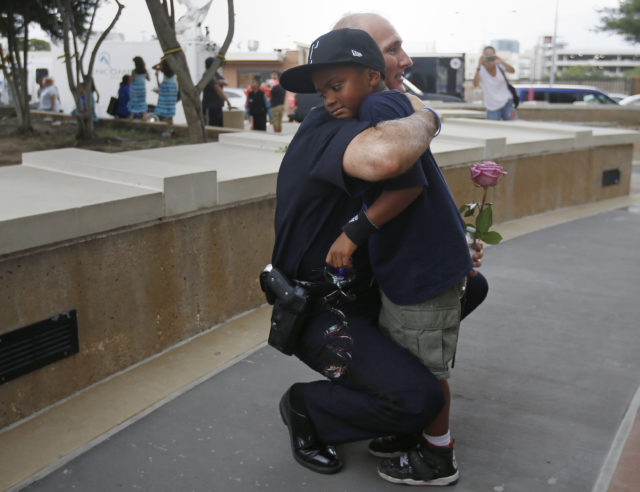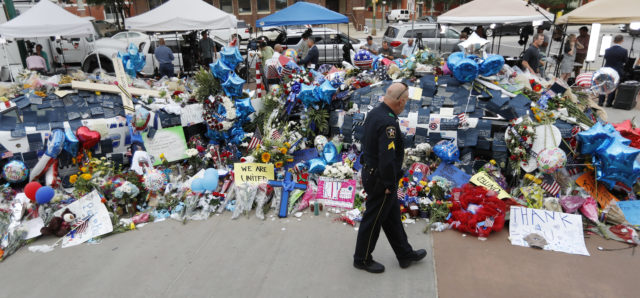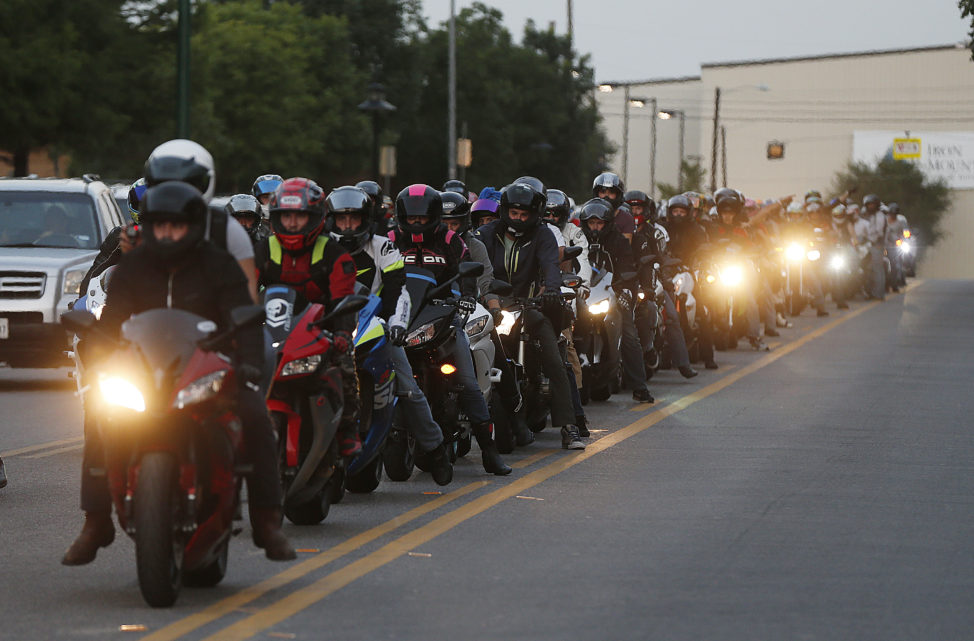
A Dallas Police officer hugs a child who came to pay respects at a makeshift memorial at Dallas Police Headquarters following the multiple police shootings in Dallas, Texas, U.S., July 9, 2016. (Reuters)
Dallas, Texas is bracing for a week of anguish, burying five police officers, killed by a man who the Dallas police chief said “was asking us how many did he get. And he was telling us how many more he wanted to get.”
President Barack Obama will be in Dallas Tuesday, once again assuming the role of consoler-in-chief at an interfaith service. With him, Vice President Biden and former president George W. Bush, who also was the governor of Texas.
Thursday’s killings of the police officers, Wednesday’s police shooting of a black man in Minnesota and Tuesday’s police shooting of a black man in Louisiana is again raising — and politicizing — the issues of policing and race relations — past, present and future.
A Week from Hell
Charles M. Blow – The New York Times
Friday morning, after the Dallas shootings, my college student daughter entered my room before heading out to her summer job. She hugged me and said: “Dad, I’m scared. Are you scared?” We talked about what had happened in the preceding days, and I tried to allay her fears and soothe her anxiety.
How does a father answer such a question? I’m still not sure I got it precisely right.
Truth is, I am afraid. Not so much for my own safety, which is what my daughter was fretting about, but more for the country I love.
This is not a level of stress and strain that a civil society can long endure.
Extraordinary exchange by a surgeon who treated the shot officers in Dallas with police and fellow surgeon:
Speaking: Dr. Brian Williams, trauma surgeon at Parkland Memorial Hospital; Capt. Dan Birbeck, Dallas County Hospital Police Department and Dr. Alex Eastman, Lt. Dep. Chief Medical Officer, Dallas Police Department;
Is America Repeating the Mistakes of 1968?
Julian E. Zelizer – The Atlantic
Today, America has a president who understands the urgent need to address the problems of institutional racism that have been broadcast to the entire world through smartphones and exposés of a racialized criminal-justice system. But this conflict is taking shape right in the middle of a heated election season—one that includes a candidate who has made draconian proposals for national security and who appeals to the “Silent Majority.”…
This is not the first time this has happened. When questions over race and policing were front and center in a national debate in 1968, the federal government failed to take the steps necessary to make any changes….
1968 and 2016
Bill Schneider – The Huffington Post
A policeman visits a makeshift memorial at the Dallas police headquarters, Monday, July 11, 2016, in Dallas. Five police officers were killed and several injured during a shooting in downtown Dallas July 7. (AP)
Of course, the electorate in 2016 is vastly different from what it was in 1968: less white, better educated, less religious and with more empowered women. All of which works to the Democrats’ advantage.
The narrow winner of the 1968 election was Republican Richard Nixon. Nixon wasn’t running as a racial backlash candidate in 1968. That came later, in 1972, when he used his southern strategy to fold the Wallace vote into the GOP. The evidence? Nixon’s worst state in 1968 was Mississippi (Nixon 14 percent, Wallace 63 percent). Nixon’s best state in 1972 was Mississippi (Nixon 78 percent)….
There is no Nixon figure who can plausibly promise to “bring us together’’ this year. Both Hillary Clinton and Donald Trump are polarizing figures.
The Cop-Hater in Chief
Edmund Kozak – Politizette
Anyone who doubts the extent to which Obama’s presidency has been marked by pronounced distaste for police officers — especially white ones — need only look to the litany of ideologically motivated, anti-police statements the president has made since he assumed office.
When Harvard University professor Henry Louis Gates was arrested on July 16, 2009, outside his home after police received reports of an individual trying to force entry into the house, Obama said the arresting officer, Sgt. James Crowley, “acted stupidly.”…
After black teenager Trayvon Martin was shot by the overzealous, “White-Hispanic” George Zimmerman — because in Obama’s America Hispanics magically become white people if they shoot a black person — Obama said that, “If I had a son, he’d look like Trayvon.”
Of course, Obama declined to say if his son would have played hooky and assaulted a community watch volunteer, bashing his head repeatedly into the pavement.
The Thin Blue Line Between Us
Eric L. Adams – The New York Times
I have worn the blue uniform of the New York City Police Department, upholding the law even as I raised my voice to reform its enforcement and make policing better. I have also worn the blue jeans of a black father concerned about the safety of his family.
A group of motorcycles, organized by the group Ride DFW, ride past the memorial in front of police headquarters to pay respects in Dallas, Sunday, July 10, 2016. A peaceful protest over the recent videotaped shootings of black men by police turned violent Thursday night as gunman Micah Johnson shot at officers. (AP)
That duality is not unique to me; it is very familiar to all law enforcement officers from communities of color. Violence causes us to blur each other’s complexities, to try to line up the world on one side of the battlefield or the other.



